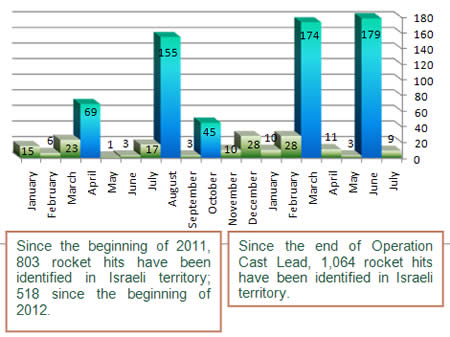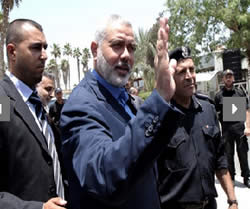- This past week the amount of sporadic rocket fire from the Gaza Strip increased, with ten rocket hits identified in Israeli territory (as opposed to isolated rocket hits during previous weeks.)
- On July 29 an event occurred north of Jerusalem in which a Palestinian was killed and an Israeli policeman suffered slight wounds. According to statements from policemen they were attacked when a Palestinian vehicle attempted to break through the roadblock. The Palestinian Authority blamed Israel for the Palestinian's death.
- During the first half of 2012 there was a significant increase in the so-called soft violence in the Jerusalem area, manifested primarily by Molotov cocktails, stabbings and stone-throwing. The attacks wounded 29 Israelis, 13 of them members of the security forces.
Rocket Fire
- This past week there was an increase in rocket fire targeting Israel's south. During the week ten rocket hits were identified in Israeli territory. The rockets fell in open areas. One Israeli woman suffered minor wounds; no property was damaged.
- On July 28 five rocket hits were identified, two of them landing in an open area near the southern Israeli town of Sderot.
- On July 24 the Iron Dome aerial defense system intercepted and destroyed a rocket targeting the region of the coastal city of Ashqelon.
Rockets Fired into Israeli Territory Since the Beginning of 2011[1]

Shots Fired at a Roadblock North of Jerusalem
- On the night of July 29 shots were fired north of Jerusalem at a roadblock near the city of Maaleh Adumim in which a Palestinian was killed and an Israeli policeman wounded. According to statements from policemen who were present at the time, the event occurred when a Palestinian vehicle attempted to break through the roadblock and run over the policemen stationed there. The police shot at the vehicle and a Palestinian in the vehicle was fatally wounded and died later in a hospital. One policeman was sustained minor wounds from the shrapnel ricochet.
- The presidential office of the Palestinian Authority issued a statement condemning the incident. According to the announcement, which was inaccurate and fabricated, the death of the Palestinian civilian was premeditated and he was killed "in cold blood" (Wafa News Agency, July 30, 2012). Palestinian Authority prime minister Salam Fayyad blamed the Israeli government for the Palestinian's death. He said that the existence of the so-called Israeli "occupation" and the existence of the roadblocks were the root of the problem, and they continued claiming victims (Wafa News Agency, July 13, 2012).
Soft Violent at the Friction Points
- This week as well there were riots at the traditional friction points in Judea and Samaria, especially the villages of Bila'in, Nili'in and Nebi Saleh. Rioters threw stones at the IDF forces, who in certain instances used riot control equipment to disperse the demonstrators. In addition, in a number of instances stones and Molotov cocktails were thrown at Israeli civilian and security vehicles.
- According to the Israel Security Agency, during the first half of 2012 there was a significant increase in the amount of "grassroots" terrorism in Jerusalem. It included mainly incidents of stabbing/personal attacks, as well as Molotov cocktails and stones thrown at Israeli civilians and members of the Israeli security forces. There were three cases of stabbing and/or other personal attacks, more than 70 Molotov cocktails were thrown, and there were hundreds of cases of stone-throwing. The attacks wounded 29 Israelis, 13 of them members of the security forces (Israel Security Agency website, July 2012).
- An examination of events over the past year indicates three focal primary friction points in the Jerusalem region:
- The A-Tour/Mount of Olives area east of the Old City
- The Issawiya area northeast of the Old City
- The neighborhoods of Ras al-Amud and Silwan southeast of the Old City
Religious Indoctrination Emphasizes Jihad on the Eve of Ramadan
- On July 25, during the Muslim religious month of Ramadan, Sheikh Abdallah al-Shami, senior Palestinian Islamic Jihad figure in the Gaza Strip, visited PIJ military-terrorist operatives east of Gaza City. Al-Shami, considered a religious leader, wore a uniform and carried a Kalashnikov assault rifle. He praised the terrorist operatives and stressed the importance of jihad and the armed campaign. He is known for praising suicide bombing attacks (Website of the PIJ's military-terrorist apparatus, July 25, 2012).

Right: Abdallah al-Shami in ordinary dress (Picture from the jgaza.ps website, July 16, 2012). Left: Abdallah al-Shami wearing a uniform with a Kalashnikov assault rifle slung around his neck during a visit to PIJ terrorist operatives (Picture from the saraya.ps website, July 25, 2012).
Aid Convoy to the Gaza Strip
- Wael al-Saqa, chairman of the Jordanian LifeLine aid convoy committee, said there were plans to send a third convoy to the Gaza Strip, part of the Ansar convoys. It will depart from Aqaba with an estimated 100 participants during the second half of September and remain in the Gaza Strip for a week (Filastin al-Yawm, July 29, 2012).
Ismail Haniya Meets the Egyptian President
- On July 25, Ismail Haniya, head of the de-facto Hamas administration, arrived in Egypt to meet with Egyptian President Mohamed Morsi, heading a delegation of senior Hamas figures from the Gaza Strip. At the meeting Haniya raised a number of urgent issues, such as the opening of the Rafah crossing and the delivery of fuel to the Gaza Strip. In an attempt to alleviate Egyptian concerns, Haniya stressed that the Hamas administration would not release Israel from its humanitarian responsibilities to the Gaza Strip (PalestineOnline website, July 28, 2012).
- Mohamed Morsi promised to ease conditions at the Rafah crossing by leaving it open longer, increasing the number of people allowed through every day and reducing the number of those prevented by security issues from entering Egypt. He also promised to solve the Gaza Strip's energy crisis in three stages: increasing the amount of fuel donated by Qatar to run Gaza's power plant, connecting the plant to gas lines, and connecting the Gaza Strip to the regional electric grid (PalestineOnline website, July 28, 2012).
- During the visit Haniya also met with senior figures of the Muslim Brotherhood in Egypt, including Mohammed Badie, the General Guide (PalestineOnline website, July 28, 2012). After the meeting Mohammed Badie said in an official announcement that the Palestinian cause was the most important issue for Muslims around the world and had been for the Muslim Brotherhood since its inception (PalestineOnline website, July 28, 2012).
- On July 28 Ismail Haniya returned to the Gaza Strip through the Rafah crossing. Hamas sources said the visit had been a success and marked a genuine turning point in relations with Egypt (Hamas' palestine-info website, July 29, 2012):
- Taher al-Nunu, spokesman for the de-facto Hamas administration, said that politically the meeting had been very important, especially regarding the lifting of the political closure of the Hamas administration. He said it was obvious that Mohamed Morsi completely understood the Palestinian problem and had shown a desire to support the residents of the Gaza Strip. He also said there had been a fundamental and important change in Egypt's policy toward Gaza, including everything relating to Israel's future aggression toward it (Alresalah.net website, July 30, 2012).
- Bassem Naim, minister of health in the de-facto Hamas administration, said that the results of Haniya's meeting with the Egyptian president were an important step toward lifting the closure of the Gaza Strip and would influence its health system, which he claimed was suffering from a lack of medicines (Safa News Agency, July 29, 2012).

Ismail Haniya at the Rafah crossing en route to Egypt (Picture from the qassam.ps website, July 29, 2012).
Jibril Rajoub Congratulates the President of the Olympic Committee on His Decision Not to Hold a Minute of Silence for the Israeli Athletes Massacred in Munich
- On July 24,Jibril Rajoub, a member of Fatah's Central Committee, currently chairman of the PA's soccer association and its Olympic committee, sent a letter to IOC president Jacques Rogge. In it he thanked and praised him for the IOC's refusal to agree to Israel's request for a minute of silence at the opening ceremony of the games in London to honor the memory of the Israeli athletes murdered in Munich in 1972.[2]
- In the letter Rajoub claimed that Rogge's position regarding the non-politicizing of sports and his determination to implement the international Olympic covenant was a "victory for the freedom of sports" (Qudsnet website, July 25, 2012). On another occasion he said that the Palestinians wanted to exploit the Olympics in London to represent the Palestinian cause "in a cultured way" (Akhbarak website, July 24, 2012).
- Note: The Israeli athletes were murdered in Munich by the Black September Organization, founded by Yasser Arafat after the "black September" in Jordan,[3] and in effect Fatah's overseas terrorist apparatus. Jibril himself carried out terrorist attacks against Israel and was imprisoned in Israel for many years.
The Campaign to Boycott Israeli Goods Continues
- The Palestinian Authority is exploiting the Muslim religious month of Ramadan to ramp up its campaign to boycott Israeli-manufactured products, although it is not greatly effective. For example, the slogan of the campaign in Samarian city of Nablus is "Break your fast by boycotting your occupier." The campaign is being waged by activists who visit markets and private homes to explain the importance of boycotting goods manufactured in Israel.

Activists in Nablus in the markets call for Israeli goods to be boycotted (Pictures from the Safa News Agency website, July 26, 2012).
[1]As of July 31, 2012.
[2]In 1972, eleven members of the Israeli athletic team were taken hostage by Palestinian terrorists from the Black September Organization during the Munich Olympic Games. They were all massacred. In the intervening years the International Olympic Committee had steadfastly refused to mention them during the opening ceremony of the games, as again happened this year in London.
[3]In September 1970 King Hussein of Jordan moved to crush Palestinian terrorist organizations and restore his rule over the country; thousands died, the majority Palestinians.












